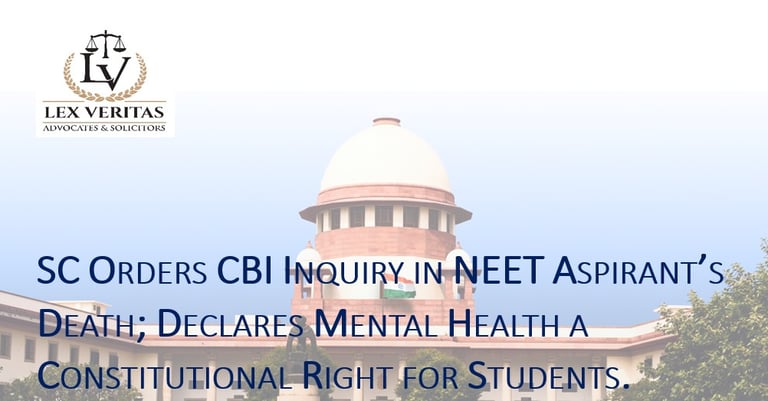Judgement Review
SC Orders CBI Inquiry in NEET Aspirant’s Death; Declares Mental Health a Constitutional Right for Students.
7/28/20253 min read


Factual Background:
This case arose from the tragic and suspicious death of a 17-year-old NEET aspirant, Ms. X, who had moved from West Bengal to Visakhapatnam, Andhra Pradesh, for her medical entrance preparation. She was studying at Aakash Byju’s coaching institute and residing at Sadhana Hostel. On the night of 14 July 2023, she allegedly fell from the hostel terrace. Though admitted to the hospital, she died on 16 July 2023. Her father, Mr. Sukdeb Saha, suspected that the death was not a suicide but potentially involved foul play, negligence, and a cover-up. After being dissatisfied with the local police investigation, he approached the Andhra Pradesh High Court seeking a transfer of the investigation to the Central Bureau of Investigation (CBI). The High Court dismissed the plea, prompting the petitioner to file a Special Leave Petition before the Supreme Court.
Issues:
Did the local police conduct a fair, effective, and impartial investigation?
Was a CBI investigation justified under the facts of this case?
Can the Court issue guidelines to address student suicides and institutional failures?
Investigation Found Lacking: Serious Procedural and Evidentiary Lapses
The Court found numerous inconsistencies and procedural failures in the local investigation. It noted contradictions in the CCTV footage particularly that the girl seen entering the terrace was dressed differently from the one found injured, creating doubt about the identity or timeline. Forensic samples, especially the viscera, were destroyed before DNA analysis, contrary to court directions and scientific protocol. It was also established that the deceased was conscious upon hospital admission, yet no statement or dying declaration was recorded. Further, the same doctor performed the autopsy, conducted the chemical analysis, and sat on the inquiry committee—posing a serious conflict of interest. Importantly, key forensic and hospital documents were either withheld or destroyed, and the police made misleading public statements downplaying these facts.
Legal Grounds for CBI Transfer
In light of these deficiencies, the Supreme Court concluded that the investigation was compromised. It relied on constitutional provisions and legal precedents to justify the extraordinary remedy of transferring the case to the CBI. Citing Article 21 of the Constitution (Right to Life), the Court emphasized that the right to a fair investigation is an essential component of justice. It also invoked Article 32 (for enforcement of fundamental rights) and Article 141 (law declared by the Supreme Court is binding) to issue necessary directions. The Court cited prior judgments like State of West Bengal v. CPDR and Arnab Goswami v. Union of India, which clarified that CBI transfers may be ordered in exceptional circumstances where local investigation is unreliable or biased.
Directions to CBI and Authorities
The Court ordered the immediate transfer of the investigation to the CBI. It directed that all evidence, including CCTV footage, medical records, and forensic reports, be handed over without delay. The CBI was instructed to complete the investigation and submit its report under Section 193(2) of the Bhartiya Nagarik Suraksha Sanhita (BNSS), 2023. India’s new procedural law within four months.
The Court clarified that all observations made were prima facie and would not influence the outcome of the investigation or any future trial.
Recognizing a Mental Health Crisis in Education
Beyond the individual case, the Court used this judgment to address a growing national concern student suicides and mental health breakdowns in the academic ecosystem. Referring to NCRB data, the Court noted that over 13,000 students died by suicide in 2022, many due to academic stress, isolation, discrimination, and institutional apathy. The Court stated that mental health is part of the Right to Life under Article 21, and institutions have a constitutional duty to ensure students’ psychological safety. It referenced the Mental Healthcare Act, 2017 and international obligations under the ICESCR, CRPD, and WHO guidelines to reinforce this interpretation.
Binding Guidelines for Educational Institutions
To fill the legislative vacuum, the Court issued interim binding guidelines under Articles 32 and 141. These must be followed by all schools, colleges, coaching centres, and hostels until Parliament or the Government introduces a comprehensive law.
The key directives include:
Adoption of a mental health policy at all institutions, modeled on UMMEED and MANODARPAN frameworks.
Appointment of one trained counsellor per 100 students.
Prohibition of academic segregation, such as separating students into batches based on performance.
Mandatory training for staff to recognize early signs of distress.
Establishment of complaints committees to deal with bullying, harassment, or caste/gender discrimination.
Display of suicide helpline numbers, like Tele-MANAS, throughout campuses.
Annual submission of mental wellness reports to UGC, CBSE, AICTE, and other regulators.
Failure to comply with these guidelines may amount to institutional culpability.
Directions to Governments
The Court also placed obligations on State and Central Governments. It directed all States and Union Territories to frame rules within two months for the registration and regulation of private coaching centres. District-level monitoring committees, headed by District Magistrates, must oversee compliance. The Union Government was instructed to file a compliance affidavit within 90 days.
Conclusion
The judgment in Sukdeb Saha v. State of Andhra Pradesh stands as a watershed moment in Indian jurisprudence. The Supreme Court has not only corrected a flawed criminal investigation but also created a constitutional framework to protect the mental health of students across the country. By linking the right to emotional well-being with the Right to Life under Article 21, and by enforcing proactive institutional responsibility, the Court has expanded the horizon of justice from mere punishment to systemic reform and human dignity.
Integrity
Empowering clients with clarity and legal expertise.
Contact
Subscribe Us
info@lexveritaslegal.com
+91 73968 72581
© 2025. All rights reserved. Powered by Itformula1


